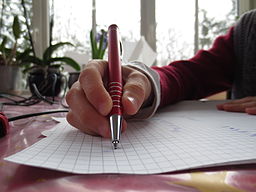
Double Check that Spelling!
Every year GCSE and A’ level students lose marks during the writing of essays, dissertation projects and exams due to poor spelling.
However long it takes, it is always worth reading through your work once it is complete to check for errors. If you have used words with spellings you are unsure of, use the spell checker on your computer (though bear in mind its standard use of American English) or pick up the nearest dictionary.
Some of the most common spelling errors found on exam papers come from words that are spelt correctly, but are incorrectly used. One of the most frequently found mistakes revolves around the word ‘there.’ When double checking your work, make sure that you have the correct ‘there’ for the sentence you are constructing.
There (over there; there was) – ‘There was a large cow in the field.’
Their (belonging to) – ‘Their cow stood in the field.’
They’re (they are) – ‘They’re waiting for the cow to come into the field.’
Another common error involves the misuse of the words ‘whether’ and ‘weather.’
Whether (signifying a query or an option) – ‘They weren’t sure whether they would need an umbrella.’
Weather (rain, sunshine etc) – ‘The weather was very bad.’
When writing at speed, especially when typing, it is easy to accidentally miss off the end letter from a word. For example, if you meant to write ‘made’ but left off the ‘e’, you’ll have the word ‘mad’ which will not register as a mistake when using a computer’s spell check function. This highlights why it is so important not to rely on a spell checker entirely, and to read through your work very carefully.
With any word you are unfamiliar with when writing an essay, always double check its spelling in a dictionary. The fewer spelling mistakes you make, the better your overall grade will be at the end of your studies.
